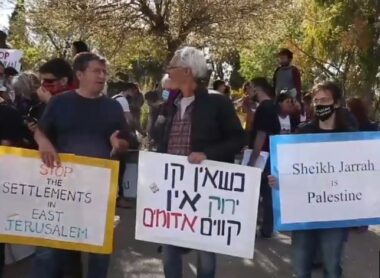Israeli soldiers attacked, Friday, the weekly nonviolent protest the escalating illegal colonialist activities in Sheikh Jarrah, in the occupied Palestinian capital, Jerusalem, wounding 9 Palestinians, including one journalist.
The Palestinian Red Crescent Society (PRCS) has confirmed that its medics provided treatment to nine Palestinians, including four who were shot with rubber-coated steel bullets.
It added that one of the injured Palestinians is a photojournalist working for the Al-Quds Newspaper, in Jerusalem.
The PRCS also said that the soldiers and the police attacked many Palestinians with batons, wounding five, who suffered various cuts and bruises.
The Palestinians were nonviolently marching to demand an end to the illegal takeover of their homes and buildings for the benefit of the illegal colonialist settlers and their outposts.
They called for aiding the Palestinian families in Sheikh Jarrah, as well as other parts of occupied Jerusalem, in their struggle to keep their homes and property amidst the extensive Israeli campaign to demolish them or illegally occupy them to establish new colonies.
Sheikh Jarrah is a Palestinian neighborhood of twenty-eight homes and residential buildings and is inhabited by more than 500 Palestinians threatened with displacement and expulsion.
Israel’s colonies in the occupied West Bank, including those in and around occupied Jerusalem, are illegal under International Law, the Fourth Geneva Convention, in addition to various United Nations and Security Council resolutions.
Amnesty International:
STATUS OF SETTLEMENTS UNDER INTERNATIONAL LAW
Article 49 of the Fourth Geneva Convention states: “The Occupying Power shall not deport or transfer parts of its own civilian population into the territory it occupies.” It also prohibits the “individual or mass forcible transfers, as well as deportations of protected persons from occupied territory”.
As the occupier, Israel is therefore forbidden from using state land and natural resources for purposes other than military or security needs or for the benefit of the local population. The unlawful appropriation of property by an occupying power amounts to “pillage”, which is prohibited by both the Hague Regulations and Fourth Geneva Convention and is a war crime under the Rome Statute of the International Criminal Court and many national laws.
Israel’s building of settlements in the West Bank, including in East Jerusalem, does not respect any of these rules and exceptions. Transferring the occupying power’s civilians into the occupied territory is prohibited without exception.
Furthermore, as explained earlier, the settlements and associated infrastructure are not temporary, do not benefit Palestinians, and do not serve the legitimate security needs of the occupying power.
Settlements entirely depend on the large-scale appropriation and/or destruction of Palestinian private and state property which are not militarily necessary. They are created with the sole purpose of permanently establishing Jewish Israelis on occupied land.
In addition to being violations of international humanitarian law, key acts required for the establishment of settlements amount to war crimes under the Rome Statute of the International Criminal Court.
Under this body of law, the “extensive destruction and appropriation of property not justified by military necessity and carried out unlawfully and wantonly” and the “transfer, directly or indirectly, by the Occupying Power of parts of its own civilian population into the territory it occupies, or the deportation or transfer of all or parts of the population of the occupied territory within or outside this territory” constitute war crimes. As stated above, “pillage” is also a war crime under the Rome Statute.
Israel’s settlement policy also violates a special category of obligations entitled peremptory norms of international law (jus cogens) from which no derogation is permitted.
The International Court of Justice (ICJ) affirmed that the rules of the Geneva Conventions constitute “intransgressible principles of international customary law”. Only a limited number of international norms acquire this status, which is a reflection of the seriousness and importance with which the international community views them. Breaches of these norms give rise to certain obligations on all other states, or “third states”, which are explained below.

